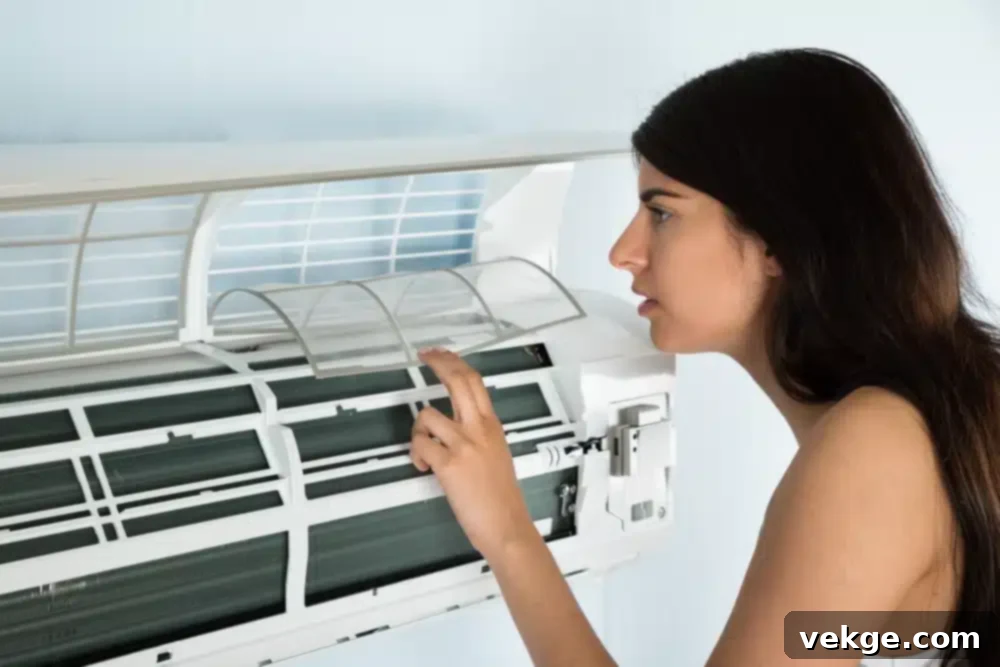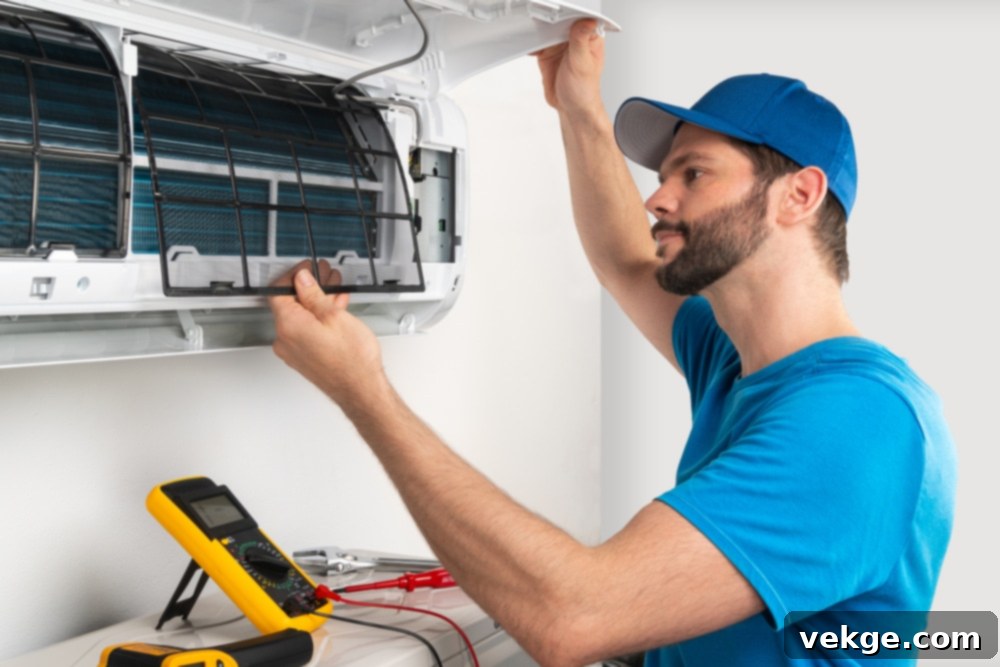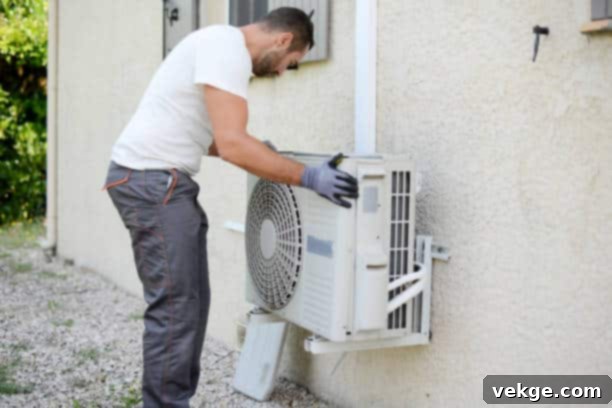Decoding Your AC’s Noises: A Comprehensive Guide to Identifying, Fixing, and Preventing Air Conditioner Sounds
A well-functioning air conditioner should operate quietly, almost imperceptibly, as it cools your home. However, if you suddenly start hearing unusual sounds like a hiss, gurgle, bang, hum, click, or shriek coming from your AC unit, it’s a clear signal that something isn’t right. While these AC unit noises might not always indicate an emergency, they should never be ignored. Taking these sounds seriously is crucial, as they often point to underlying issues that, if left unaddressed, could lead to significant problems and costly repairs down the line.
Understanding the “language” of your air conditioner can empower you to act quickly. By learning what specific sounds mean, how to identify them, and the appropriate steps to take, you can prevent minor glitches from escalating into major system failures. This comprehensive guide will walk you through common AC unit noises, their potential causes, why you shouldn’t delay action, and essential preventative maintenance tips to keep your system running smoothly and silently.
Common AC Noises and Their Underlying Causes

Normally, your air conditioning system operates with minimal audible disturbance. It’s when your AC begins making unusual or excessively loud noises that it truly grabs your attention. These sudden changes in sound profile are your AC’s way of signaling distress, potentially indicating a significant underlying problem that requires investigation. Ignoring these auditory warnings can lead to reduced efficiency, increased energy bills, and ultimately, premature system failure.
Air conditioners can produce a surprisingly wide range of sounds, each offering a clue to its specific ailment. You might encounter a constant humming, a distinct clicking, a rushing whoosh, a startling bang, or even an alarming shriek. Pinpointing the exact type of sound is the first step in diagnosing the issue. Often, a loud air conditioner noise, regardless of its specific type, can indicate that your AC unit is dirty, suffering from neglected maintenance, or experiencing a mechanical failure that necessitates professional service.
Why Ignoring AC Unit Noises Is a Risky Business
When your air conditioner starts making noises, the immediate questions are often: “Why is my air conditioner making these noises?” and “How do I accurately describe this noise to an HVAC technician?” While some common issues like a slight humming or minor rattling might seem innocuous, it’s crucial to understand that even small problems have the potential to spiral into much larger, more expensive complications if left unaddressed. Ignoring these early warning signs is a common mistake that can lead to significant discomfort and financial burden.
Consider an AC humming noise, for instance. What might seem like a minor electrical buzz could actually be an indicator of a refrigerant leak. Depending on the type of refrigerant used in your system, a leak can pose potential health hazards to your family and is also extremely detrimental to the environment. Beyond direct dangers, any underlying issue, whether it’s a failing component or a blockage, places immense stress on the entire AC system. This added strain forces your unit to work harder, consuming more energy and accelerating wear and tear on other components. Eventually, unfixed problems can lead to a complete breakdown of your AC system, often at the most inconvenient times, leaving you without essential cooling when you need it most. Proactive attention to these sounds not only saves money on costly emergency repairs but also extends the overall lifespan of your air conditioning unit.
How to Identify Specific AC Sounds and What They Signify
When you first detect an odd AC unit noise, resist the urge to panic. Instead, take a moment to carefully listen and observe. Try to describe the sound accurately – its pitch, its rhythm, whether it’s constant or intermittent. In some cases, if the air conditioner noise is distinct enough, you might even consider recording it with your smartphone; this can be incredibly helpful for an HVAC technician when they arrive to diagnose the issue. Understanding the most common AC unit noises and their typical meanings will significantly aid in this process.
Here’s a breakdown of specific AC sounds and their implications:
Humming: A Sign of Internal Struggle
An AC humming noise often suggests that the compressor is struggling to start or operate efficiently. This critical component is the heart of your AC system, and a persistent hum can indicate that it’s overworking or failing. Other common causes for a humming sound include an undercharged or leaking refrigerant system, which reduces the compressor’s ability to cool effectively, leading to strain. Additionally, a failing starting capacitor, which provides the initial electrical boost for the compressor, can manifest as a distinct hum as the compressor tries unsuccessfully to kick into full gear. Left untreated, these issues can lead to compressor burnout.
Clicking: Electrical or Mechanical Alarms
When you notice your AC unit making clicking noises, especially at the beginning or end of a cycle, it typically points to an electrical issue. This could stem from a faulty control board that isn’t sending the correct signals, a malfunctioning thermostat that isn’t accurately reading temperatures or sending commands, or a failing capacitor (start or run). Continuous clicking, especially when the unit struggles to turn on, might indicate a severe electrical problem or a relay switch trying repeatedly to engage. These issues require prompt attention to prevent electrical damage.
Whooshing or Hissing: Airflow and Refrigerant Concerns
An air conditioner makes whooshing noises when there is some type of airflow restriction within the system. The sound is essentially the air struggling to move freely. The most common culprit is a dirty or clogged air filter, which obstructs the flow of air into the system. Other causes can include blocked return vents, issues with ductwork (like leaks or collapses), or obstructions in the outdoor unit preventing proper air intake. A hissing sound, particularly if it’s high-pitched, is a much more serious indicator, often signaling a refrigerant leak. Refrigerant leaks not only compromise your AC’s cooling capacity but also pose environmental and potential health risks.
Loud Noises, Rattling, or Banging: Mechanical Distress
You may have a loud air conditioner for various reasons, each signaling mechanical stress. A rattling noise typically indicates loose parts, such as bolts, panels, or even fan blades that have become dislodged. It could also mean debris has entered the outdoor unit. Loud banging noises are more alarming and often point to a serious mechanical issue within the compressor, a loose fan blade hitting internal components, or even a damaged connecting rod. In many cases, excessively loud AC noises are caused by an accumulation of dirt, leaves, or other debris inside the machine, which can unbalance components or obstruct their movement. These sounds demand immediate investigation.
Shrieking or Squealing: Motor Malfunctions
A high-pitched shrieking or squealing noise is perhaps one of the most urgent warning signs. This sound is typically a strong indication of a problem with the fan motor, either in the indoor or outdoor unit. Worn-out or unlubricated bearings in the fan motor often produce this piercing sound as metal grinds against metal. There could also be a similar issue with the motor inside the compressor. Ignoring a shrieking noise can lead to complete motor failure, requiring a much more expensive replacement than simply lubricating or replacing bearings.
Immediate Actions to Take When Your AC Unit Makes Noise
When faced with an air conditioner making noises, swift and informed action is key to preventing further damage and ensuring your home’s comfort. Your primary goal is to diagnose the problem’s severity and protect your system. First, try to pinpoint the source and nature of the AC unit noises as accurately as you can. As mentioned, recording the sound can be incredibly helpful for a professional HVAC technician, providing them with valuable diagnostic clues before they even arrive.
Crucially, it’s important to turn off the AC system as soon as you detect a strange or loud noise. Continuing to run an air conditioner with a significant underlying problem can exacerbate the damage, potentially turning a minor repair into a major, costly replacement. Switch off the thermostat and, if possible, the circuit breaker supplying power to the outdoor unit for added safety.
Next, resist the urge to perform DIY repairs unless you are a certified HVAC professional with a clear understanding of the specific issue. Modern AC systems are complex, involving high voltages, pressurized refrigerants, and intricate electronic components. Faulty DIY repairs can not only cause worse damage to your expensive equipment but also pose serious safety risks. Instead, promptly call a reputable HVAC company for help. Professional technicians possess the expertise, tools, and experience to safely and accurately diagnose the issue and implement the correct repairs, restoring your system’s functionality and preventing future breakdowns.
When to Call for Emergency Air Conditioner Repair

While a loud air conditioner might sometimes simply mean your AC unit is dirty and requires a routine cleaning, certain sounds unequivocally signal the need for emergency air conditioner repair. Shrieking, persistent banging, a sudden grinding noise, or a strong chemical smell accompanied by a hiss are all indicators of major, potentially dangerous issues. These situations demand that you immediately stop using your AC unit and contact an HVAC company for urgent assistance. Running a system with a critical malfunction can lead to irreversible damage to core components like the compressor or motor, transform a repairable problem into a complete system replacement, and even pose fire or carbon monoxide hazards. Don’t hesitate; prompt emergency service can save you significant trouble and expense in the long run.
Essential Preventative Maintenance Tips to Silence Your AC
The best way to avoid startling AC unit noises and the subsequent need for urgent repairs is through consistent, proactive preventative maintenance. By taking proper care of your air conditioner, you not only ensure its quiet operation but also extend its lifespan, improve its energy efficiency, and maintain optimal cooling performance. Incorporating a few simple maintenance tips into your routine can make a significant difference:
- Schedule Professional AC Maintenance Twice a Year: This is arguably the most critical step. Regular tune-ups, ideally in the spring before the cooling season and in the fall before heating season, allow HVAC technicians to thoroughly inspect your system. During these visits, they can identify and address minor issues before they escalate into major problems, often preventing those alarming noises from ever starting.
- Maintain Clear Space Around the Outdoor Unit: Ensure that plants, shrubs, leaves, and other debris are trimmed back and removed for at least two feet around the outdoor condenser unit. Obstructions restrict crucial airflow, forcing your AC to work harder, which can lead to overheating, reduced efficiency, and the development of unusual noises as components strain. Keeping the unit clear also helps dissipate heat effectively.
- Regularly Clean or Replace Your AC Filter: A dirty air filter is one of the most common culprits behind reduced airflow and increased strain on your system, which can manifest as whooshing or even humming sounds. Check your filter monthly, especially during peak usage seasons, and clean or replace it according to the manufacturer’s specifications. A clean filter ensures proper airflow, improves indoor air quality, and prevents dust and debris from entering the sensitive internal components.
- Inspect and Clean Drains: Periodically check the condensate drain line for clogs, which can lead to water backup and potential damage or gurgling noises.
- Monitor Refrigerant Levels: While not a DIY task, professional maintenance includes checking refrigerant levels. Low refrigerant can lead to humming and decreased cooling.
During these routine maintenance visits, the HVAC technician will perform a comprehensive check. This typically includes inspecting your drains for clogs, examining the heat pump (if applicable), cleaning evaporator and condenser coils, checking refrigerant lines for leaks, and testing electrical connections. They’ll also lubricate moving parts to prevent friction and wear, tighten any loose components, and ensure all system pressures and temperatures are within optimal ranges. If an issue is detected, the technician can quickly diagnose and fix it, often before you even notice a problem, thereby safeguarding your system against breakdowns and expensive repairs.
Take Control of Your AC’s Health
When you start to notice common AC unit noises, don’t delay – it’s your system’s way of asking for help. Understanding these sounds is the first step towards resolving issues. From a persistent humming to an alarming shriek, each noise offers clues to potential underlying problems that require attention. Promptly contacting emergency air conditioner repair services can help you diagnose and fix the problem efficiently, preventing the unit from incurring further, more severe damage by running with faulty parts. Beyond reactive repairs, the most effective strategy for ensuring a quiet, efficient, and long-lasting AC system is scheduling routine preventative maintenance services. By investing in regular check-ups, you proactively address potential issues, extend your unit’s lifespan, and maintain a comfortable, serene home environment. Don’t wait for your AC to scream for help; listen to its whispers and ensure its health with proper care.
